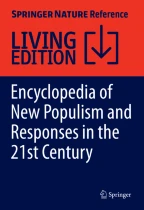The Five Agents of the New Populism

This is a study of the five actors in populism: the populist mass, the populist leader, the wealthy populist supporters, the opportunistic political parties and other cultural and social leaders, and the rejected elite or the neo-liberal democratic political leaders. I argue that the last group must learn to recognize the first group.
This is a preview of subscription content, log in via an institution to check access.
Access this chapter
References
- Barnes B (1998) Barry Goldwater, GOP hero, dies. The Washington Post. https://www.washingtonpost.com/wp-srv/politics/daily/may98/goldwater30.htm
- Betz H (2021) We are not worthless: resentment, misrecognition and populist mobilization. Fair Observer. https://www.fairobserver.com/politics/hans-georg-betz-resentment-misrecognition-populist-mobilization-politics-us-germany-news-12711/
- Bonikowski B (2016) Three lessons of contemporary populism in Europe and the United States. Brown J World Affairs 23:9–24 Google Scholar
- Capelos T, Chrona S, Salmela M, Bee C (2021) Reactionary politics and resentful affect in populist times. Politics and Governance 9. https://doi.org/10.17645/pag.v9i3.4727
- Chua A (2018) How billionaires learned to love populism. Politico. https://www.politico.eu/article/how-wealthy-elite-billionaires-donald-trump-learned-to-love-populism-politics/
- Cohen JL (2019) Populism and the politics of resentment. Jus Cogens 1:5–39. https://doi.org/10.1007/s42439-019-00009-7ArticleGoogle Scholar
- Foa RS, Wilmot J (2019) The west has a resentment epidemic. Foreign Policy https://foreignpolicy.com/2019/09/18/the-west-has-a-resentment-epidemic-populism/
- Fraser N, Honneth A (eds) (2003) Redistribution or recognition: a political-philosophical exchange. Verso Books, London Google Scholar
- Honneth A (1995) The struggle for recognition: the moral grammar of social conflicts. Polity Press, Cambridge, MA Google Scholar
- Honneth A (2020) Recognition: a chapter in the history of European ideas. Cambridge University Press, New York BookGoogle Scholar
- Keefer P, Scartascini C, Vlaicu R (2019) Social trust and electoral populism. Inter-American Development Bank. https://publications.iadb.org/publications/english/document/Social_Trust_and_Electoral_Populism_Explaining_the_Quality_of_Government_en.pdf
- Keenan JF (2022) Social trust and the ethics of our institutions. J Soc Christian Ethics 42:245 ArticleGoogle Scholar
- Mancin L (2021) Resentment and populism: a philosophical inquiry. European Center for Populism Studies. https://www.populismstudies.org/resentment-and-populism-a-philosophical-inquiry/
- Margalit Y (2019) Economic insecurity and the causes of populism, reconsidered. J Econ Perspect 33(4):152–170. https://www.jstor.org/stable/pdf/26796840.pdf
- McQueen P Social and political recognition. In: The internet encyclopedia of philosophy. Queen’s University, Northern Ireland https://www.iep.utm.edu/recog_sp/
- Mehta S (2018) Can we understand populism without calling it fascist? A conversation with Nancy Fraser Economic & Political Weekly 53. https://www.epw.in/engage/article/populism-contemporary-historical-moment-conversation-nancy-fraser
- Mrs. Roosevelt (1962), first lady 12 years, often called “world’s most admired woman”. The New York Times Google Scholar
- Mudde C (2014) The popular zeitgeist. Gov Oppos 39:541–563. https://doi.org/10.1111/j.1477-7053.2004.00135.xArticleGoogle Scholar
- Ortiz-Ospina E, Roser M (2016) Trust. Our World in data. https://ourworldindata.org/trust
- Pellauer D, Ricoeur P (2007) The course of recognition. Harvard University Press, Cambridge, MA Google Scholar
- Roberts R. (2021) Hillary Clinton’s ‘deplorables’ speech shocked voters five years ago – but some feel it was prescient. The Washington Post.https://www.washingtonpost.com/lifestyle/2021/08/31/deplorables-basket-hillary-clinton/
- Schneider B (2005) The role of Catholic voters. CNN. https://www.cnn.com/2005/POLITICS/04/08/catholic.voters/index.html
- Sohn M (2014) The good of recognition: Phenomenology, ethics, and religion in the thought of lévinas and ricœur. Baylor University Press, Waco Google Scholar
- Taylor C (1994) The politics of recognition. In: Gutmann A (ed) Multiculturalism: examining the politics of recognition. Princeton University Press, Princeton ChapterGoogle Scholar
Author information
Authors and Affiliations
- Boston College, Chestnut Hill, USA James F. Keenan S.J.
- James F. Keenan S.J.
You can also search for this author in PubMed Google Scholar
Corresponding author
Editor information
Editors and Affiliations
- School of Social Sciences, Christ University, Bengaluru, India Joseph Chacko Chennattuserry
- School of Social Sciences, Christ University, Bengaluru, India Madhumati Deshpande
- College of Business Innovation, University of Toledo, Toledo, OH, USA Paul Hong
Section Editor information
- School of Social Scences, Christ University, Bengaluru, India Joseph Chacko Chennattuserry
- CHRIST (Deemed to be University), Bengaluru, India S. P. Vagishwari
Rights and permissions
Copyright information
© 2023 Springer Nature Singapore Pte Ltd.
About this entry
Cite this entry
Keenan S.J., J.F. (2023). The Five Agents of the New Populism. In: Chacko Chennattuserry, J., Deshpande, M., Hong, P. (eds) Encyclopedia of New Populism and Responses in the 21st Century. Springer, Singapore. https://doi.org/10.1007/978-981-16-9859-0_275-1
Download citation
- DOI : https://doi.org/10.1007/978-981-16-9859-0_275-1
- Received : 21 November 2022
- Accepted : 25 November 2022
- Published : 12 July 2023
- Publisher Name : Springer, Singapore
- Print ISBN : 978-981-16-9859-0
- Online ISBN : 978-981-16-9859-0
- eBook Packages : Springer Reference Social Sciences Reference Module Humanities and Social Sciences Reference Module Business, Economics and Social Sciences

